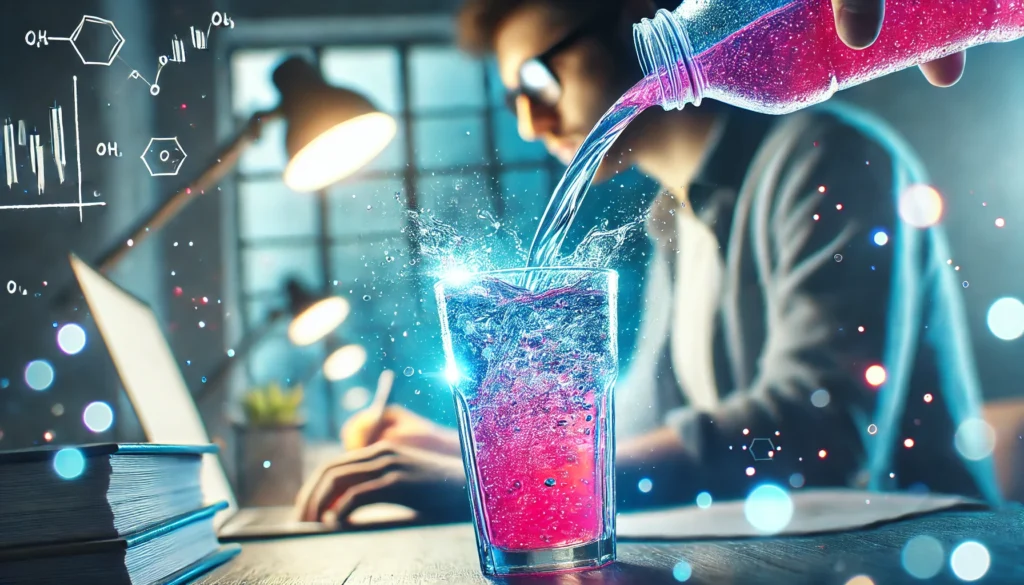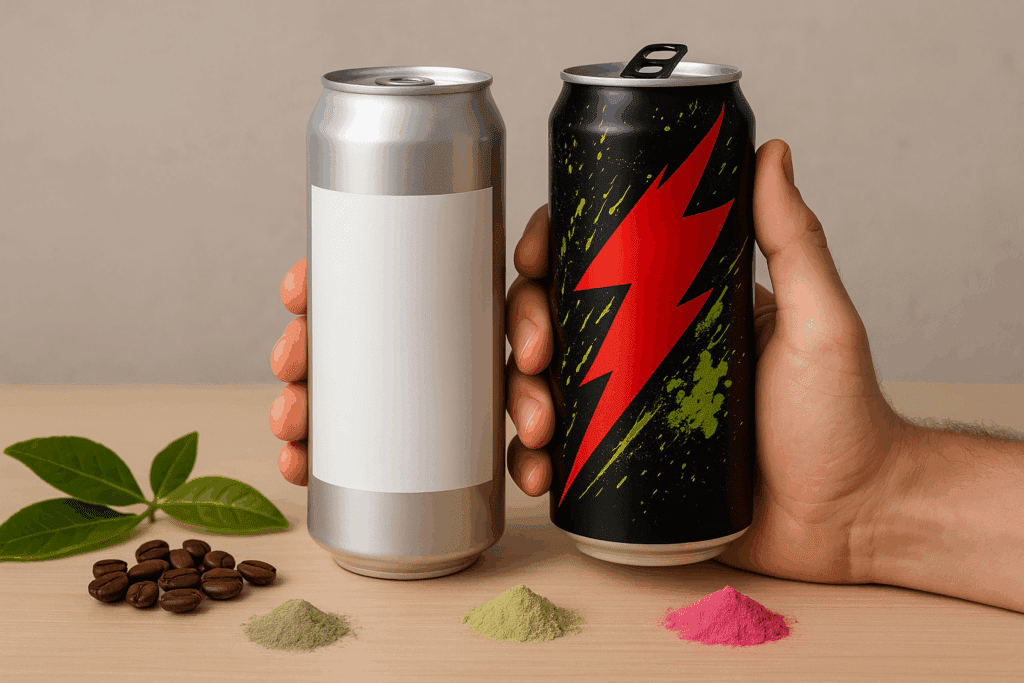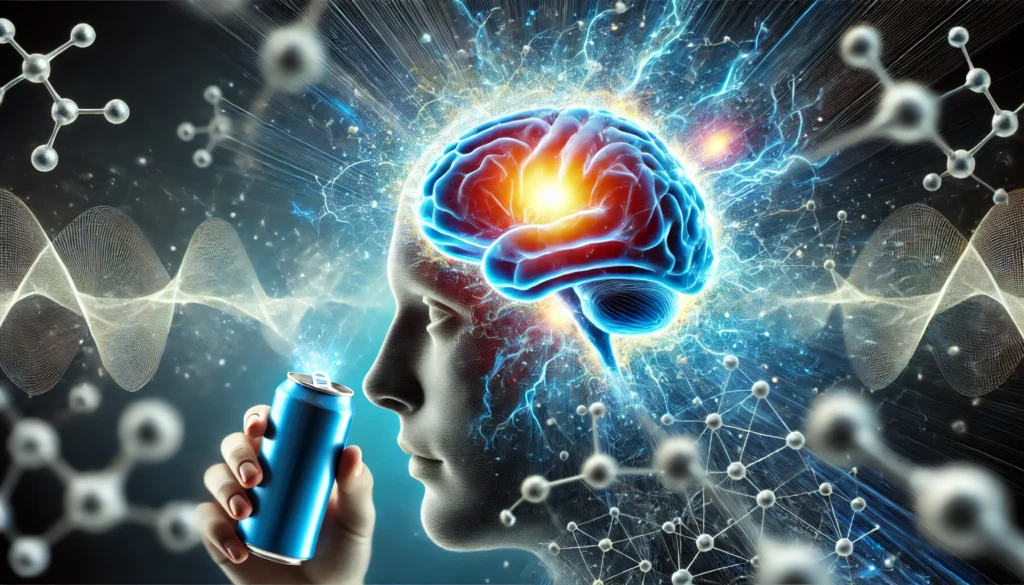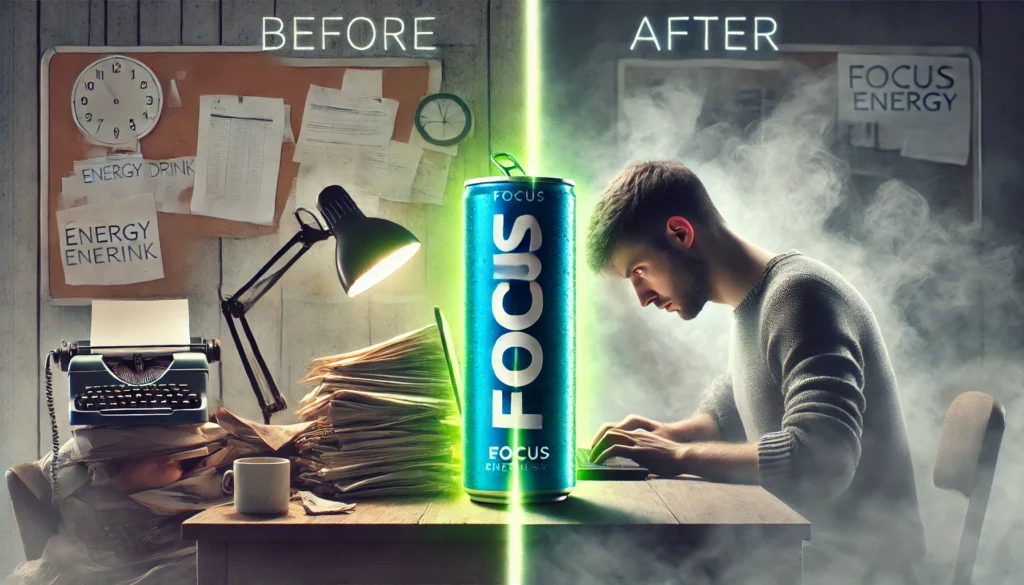In a world where mental performance is valued as highly as physical stamina, the pursuit of sustained concentration and crystal-clear thinking has become a daily priority for millions. As our days grow longer and demands increase—from workplace expectations to academic pressures—many are turning to quick-fix solutions that promise cognitive enhancement. Among the most popular of these tools is the Focus energy drink, a beverage specifically marketed to sharpen the mind, heighten awareness, and improve productivity. With bold claims and sleek packaging, these drinks sit at the intersection of wellness, neuroscience, and marketing.
You may also like: How to Improve Focus and Concentration: Proven Techniques for Boosting Mental Clarity and Productivity
But can a focus energy drink truly enhance mental clarity and concentration, or are we simply sipping on hope mixed with caffeine?
To answer that question, we must go beyond the branding and into the science. We must explore what goes into a focused energy drink, how those ingredients interact with our brain’s neurochemistry, and whether any peer-reviewed research supports their purported benefits. While some ingredients have long-standing associations with increased alertness or cognitive performance, others are relatively new to the scene or used in combinations that have not been extensively studied. Furthermore, the long-term effects of frequent consumption remain largely unknown for many products.
This article will delve into the science behind focus energy drinks, dissecting the ingredients commonly found in them, the biochemical mechanisms they may influence, and the evidence surrounding their effectiveness. We will also consider safety concerns, potential side effects, and how these drinks compare to other cognitive enhancement methods, including nootropics, mindfulness practices, and traditional nutritional approaches. For those navigating the crowded and often confusing marketplace of brain-boosting supplements, this in-depth guide aims to offer clarity grounded in evidence, not hype.

Balancing Cognitive Performance and Long-Term Brain Health
While the allure of immediate mental clarity is compelling, it’s important not to lose sight of the broader context of brain health. A focused energy drink may provide temporary enhancement in attention, alertness, or mental stamina, but it should never be seen as a substitute for foundational lifestyle practices that support cognitive well-being over the long term. For sustainable results, it is essential to integrate these drinks into a broader strategy of mental self-care rather than relying on them as standalone solutions.
Physical exercise, particularly aerobic activity, is among the most well-established methods of enhancing brain function. Regular movement stimulates the release of brain-derived neurotrophic factor (BDNF), a protein that supports the growth and maintenance of neurons. Similarly, sleep plays a vital role in memory consolidation, emotional regulation, and attention. No amount of focus drink consumption can compensate for chronic sleep deprivation, which erodes both mental and physical resilience over time.
The diet also plays a foundational role in cognitive health. Whole foods rich in omega-3 fatty acids, antioxidants, polyphenols, and vitamins support mitochondrial function and reduce inflammation in the brain. A Mediterranean-style diet, for instance, has been linked with a reduced risk of cognitive decline and enhanced executive function. While many focus energy drinks attempt to deliver micronutrients in liquid form, they are no replacement for the nutrient complexity found in whole, unprocessed foods.
Equally important is mental training itself. Practices such as mindfulness meditation, cognitive behavioral therapy, and even structured cognitive games have been shown to improve attention, emotional regulation, and working memory. The consistent use of these techniques, unlike the transient effects of a stimulant, can produce lasting neuroplastic changes in the brain. Combining these with the judicious use of a focus energy drink may produce a more comprehensive cognitive enhancement strategy.
Ultimately, true mental clarity arises not from any single product but from a confluence of supportive habits. When a focused energy drink is used wisely—alongside good sleep hygiene, regular exercise, a nutrient-dense diet, and mental training—it can amplify an already strong foundation. But when relied upon as a shortcut or quick fix, it may obscure underlying deficits that need attention. A holistic approach that prioritizes long-term brain health over short-term productivity will serve individuals far better in the long run.

How to Evaluate and Choose a Focus Energy Drink
With a dizzying array of options on the market, choosing the right focus energy drink requires more than a glance at the label. It involves critical thinking, ingredient literacy, and an understanding of one’s personal needs and responses. Not all drinks are created equal—nor are they all appropriate for every user.
The first step in evaluating a product is examining its ingredient list. Look for transparency: Are the amounts of active ingredients clearly stated? Are proprietary blends being used to obscure actual dosages? As a general rule, it’s preferable to choose products that disclose precise quantities of ingredients such as caffeine, L-theanine, or citicoline. This enables consumers to make informed decisions based on their tolerance and health profile.
Second, consider the balance between stimulant and nootropic ingredients. While high caffeine content may deliver a powerful jolt, it also raises the risk of overstimulation, particularly if consumed alongside other sources of caffeine. The best focus energy drinks balance stimulation with modulation—pairing caffeine with calming agents like L-theanine or adaptogens that promote stress resilience. This results in a more even, sustainable boost without the unpleasant crash that often follows high-stimulant formulations.
Paying attention to artificial additives is also critical. Some products contain synthetic sweeteners, colorants, or preservatives that may have questionable health impacts, particularly with regular use. For individuals sensitive to certain additives or following specific dietary restrictions, a clean-label focus drink—one free of unnecessary chemicals—may be a better choice. Increasingly, brands are offering natural or organic options that emphasize purity and minimalism.
Equally important is tracking how a drink affects you personally. Everyone’s neurochemistry is slightly different, and what works brilliantly for one person may cause irritability, insomnia, or digestive issues in another. It can be helpful to keep a journal of your responses over time—tracking not only immediate cognitive effects but also sleep quality, mood, and overall well-being. This data can inform future choices and help determine whether a particular drink truly supports your mental performance or merely masks fatigue.
Lastly, consider whether the drink fits into your broader lifestyle. Is it being used to enhance an already productive morning routine or to push through chronic sleep deprivation? Is it part of a balanced approach to wellness or an attempt to overextend your limits? When approached mindfully, a focused energy drink can serve as a useful ally. But when used recklessly or in lieu of proper rest and recovery, it risks becoming a crutch rather than a catalyst for clarity.

Frequently Asked Questions About Focus Energy Drinks
1. How does a focused energy drink differ from traditional energy drinks in terms of brain health support?
While both types of beverages can provide a burst of alertness, a focused energy drink is generally formulated with ingredients that go beyond just stimulation. Traditional energy drinks tend to rely heavily on high doses of caffeine and sugar, which can cause quick spikes and crashes in energy. In contrast, a focus drink often contains nootropics, amino acids, and adaptogens aimed at enhancing specific cognitive functions such as memory, focus, and stress resilience. These additional ingredients support neurotransmitter balance and may reduce mental fatigue in a more controlled manner. Over time, users may find that a well-formulated focus energy drink contributes more to sustained mental clarity than the short-lived buzz of conventional energy drinks.
2. Can using a focus drink daily have long-term effects on mental performance or cognitive resilience?
Regular consumption of a focused energy drink may lead to both positive and negative long-term effects, depending on the drink’s composition and how it’s integrated into a broader wellness strategy. Some ingredients, like citicoline and L-theanine, show potential for supporting neuroplasticity and cognitive endurance when used consistently. However, overreliance on any stimulant, including caffeine found in most focus drinks, may lead to tolerance or diminished baseline focus over time. Incorporating a focused energy drink into a healthy routine—alongside adequate sleep, nutrition, and mental exercise—may offer synergistic benefits. Still, cycling use and periodically reassessing your cognitive needs can prevent overstimulation and dependency.
3. Are there certain times of the day when drinking a focused energy drink is more effective?
Timing can greatly influence the impact of a focused energy drink. Most people find the best cognitive enhancement results when consuming a focus drink in the mid-morning or early afternoon, aligning with natural dips in mental alertness. Taking one too late in the day, especially if it contains caffeine, may interfere with sleep quality and next-day concentration. Individuals working night shifts or dealing with irregular schedules may benefit from tailoring intake to their personal circadian rhythms. The key is to use a focus energy drink to complement your natural energy cycles rather than override them entirely.
4. Can a focus energy drink improve performance during creative or non-linear thinking tasks?
While focus drinks are typically associated with sustained attention and analytical tasks, certain ingredients may also support creativity. Compounds like L-theanine can promote relaxed alertness, which is conducive to idea generation and pattern recognition. Some focus energy drinks include adaptogens like Rhodiola rosea, which may enhance mental flexibility during stress. The combination of stimulation and calm can create an ideal mental environment for both creative and logical thinking. However, not all focus drink formulations are equal, so users should experiment to find what best supports their specific cognitive goals.
5. Are there any risks when combining a focused energy drink with other supplements or medications?
Yes, combining a focused energy drink with other supplements or medications can pose risks, particularly if there’s an overlap in stimulant ingredients or compounds that affect neurotransmitters. For example, stacking a focus drink with prescription stimulants may amplify effects on heart rate, blood pressure, or anxiety. Likewise, mixing nootropics like alpha-GPC or citicoline with antidepressants should be done cautiously under medical supervision. It’s essential to review the ingredient panel of any focus energy drink and consult a healthcare provider if you’re taking medications or other cognitive enhancers. Personalized advice ensures safety and maximizes potential benefits without adverse interactions.
6. What are some early signs that a focused energy drink may not be suitable for an individual?
Not everybody responds positively to the same formulation, and certain reactions may indicate a mismatch. Signs that a focus energy drink may not be suitable include insomnia, jitteriness, increased anxiety, gastrointestinal upset, or headaches shortly after consumption. If you experience any of these symptoms consistently, it may suggest sensitivity to one or more active ingredients. In such cases, switching to a lower-stimulant version or a caffeine-free focus drink might be more appropriate. Always listen to your body’s feedback and consider trialing new beverages in low doses to gauge compatibility.
7. How can professionals or students integrate focus energy drinks without becoming reliant on them?
To avoid dependence, individuals should use a focus energy drink strategically rather than habitually. Incorporating it into high-demand days or cognitively intensive projects can maximize benefits without building tolerance. It also helps to pair focus drinks with productivity techniques like the Pomodoro method or mindfulness breaks, which can reinforce mental stamina independently of chemical stimulants. Tracking usage and alternating between caffeinated and non-caffeinated versions of a focus drink can also reduce dependency risks. Ultimately, treating these beverages as tools—not necessities—empowers users to remain in control of their cognitive performance.
8. Are there innovations in the focus drink industry that go beyond traditional ingredients?
Yes, the focus energy drink landscape is rapidly evolving, with newer formulations incorporating cutting-edge ingredients like noopept, phosphatidylserine, or Lion’s Mane mushroom extract. These additions target neurogenesis, long-term memory, and synaptic repair, moving beyond mere short-term stimulation. Some brands are also using time-release technology or liposomal delivery systems to enhance bioavailability. Additionally, there’s a growing trend toward sugar-free, vegan, or keto-friendly versions of the typical focus drink to align with consumer health values. These innovations reflect a shift toward creating smarter, cleaner cognitive support options.
9. How do social and psychological expectations influence the effectiveness of a focus energy drink?
The placebo effect can significantly impact how a focus drink is experienced. When individuals believe a drink will make them more focused or productive, they often report noticeable cognitive improvements—even if the ingredients are mild or inactive. Social cues, branding, and prior experiences with similar products can shape this perception. This psychological component doesn’t diminish the value of a focused energy drink but underscores the importance of mindset in any performance-enhancing strategy. For optimal results, combining positive expectations with scientifically supported formulations can amplify both real and perceived benefits.
10. What should first-time users look for when selecting a high-quality focus energy drink?
New users should prioritize transparency, efficacy, and safety when choosing a focus drink. Look for brands that clearly list ingredient amounts and avoid vague proprietary blends. A well-balanced focus energy drink will contain not just caffeine but complementary compounds like L-theanine or B vitamins that support smooth, sustained cognition. It’s also wise to check for third-party testing, especially when trying newer or lesser-known brands. Starting with a lower dose and gradually increasing as needed allows first-time users to identify what truly enhances their focus without unwanted side effects.

Conclusion: The Science and Strategy Behind Mental Clarity with Focus Energy Drinks
As the demand for cognitive enhancement continues to rise, focus energy drinks have emerged as a popular, accessible tool in the quest for sharper thinking and better concentration. Their promise of immediate mental uplift, backed by ingredients like caffeine, L-theanine, citicoline, and adaptogenic herbs, taps into a universal desire to feel more productive, more alert, and more in control. Yet while the science does support certain compounds for improving attention and reducing mental fatigue, the overall effectiveness of these beverages depends heavily on their formulation, the context in which they are used, and the individual physiology of the user.
The Main focus is they point to a deeper cultural shift toward self-optimization. However, true mental clarity is rarely the result of a single product. It is cultivated through consistent, holistic practices that nourish the brain and body. A focus energy drink may serve as a helpful complement to these strategies, but it should not be mistaken for a magic bullet.
For those considering incorporating a focus drink into their daily routine, the key lies in moderation, awareness, and informed selection. Read labels carefully, understand ingredient functions, and pay attention to your body’s signals. Use these drinks to amplify, not replace, the foundational habits of sleep, nutrition, exercise, and mindfulness. When approached with intention and insight, focus energy drinks can be part of a smart, science-based approach to cognitive enhancement.
Ultimately, what the science tells us is both empowering and cautionary: yes, certain ingredients in a focus energy drink can enhance mental performance—but only when used as part of a thoughtful, individualized, and health-conscious lifestyle. By balancing short-term gains with long-term well-being, we can achieve not just momentary focus but enduring mental clarity that supports every area of life.
Further Reading:
A Review of Energy Drinks and Mental Health, with a Focus on Stress, Anxiety, and Depression


